Category: Uncategorized
The Olympics of Court Reporting

Court reporting is court reporting, right? Well, all court
reporters are charged with being guardians of the record, and whether they’re
practicing in a deposition suite or a courtroom doesn’t change that duty.
However, there are some critical differences reporters, attorneys, and
observers should be aware of regarding a court reporter’s role in a deposition
versus a courtroom setting.
The most obvious difference between a deposition and a trial
is the atmosphere. In a deposition, the atmosphere is relaxed – compared to a
courtroom, at least. While depositions can be fast-paced and sometimes
extremely adversarial, the presence of a judge in courtroom proceedings tends to
keep attorneys – and the court reporter – on their toes. The Court waits for no
one. When the bailiff says “All rise” and court opens, the attorneys
and the court reporter better be ready.
When witnesses testify in a courtroom proceeding, either the
courtroom clerk or the judge administers the oath. In a deposition setting, a
court reporter (or possibly a videographer) administers the oath to the
witness.
During a deposition questions are frequently objected to,
and there may be other disputes between the parties. Since there is no judge
present to rule on objections, deposition witnesses still answer questions that
are objected to (unless counsel directs them not to), and the record is
preserved, to be ruled upon at a later time. In the event of other disputes between
counsel during a deposition, the court reporter’s duty is the same – to create
a record of statements made for the record by counsel, so the Court will have a
record upon which to rule at a later date. During a motion hearing or a trial,
though, the Court will usually rule immediately on an objection or other
dispute between counsel.
Deposition proceedings are almost always transcribed, but a
transcript of courtroom proceedings isn’t prepared unless one of the parties
orders it or if one party appeals the verdict. Court transcript rates in
indigent criminal proceedings are set by the Court, while court reporters
charge market rates for civil court or non-indigent criminal transcripts.
In a courtroom proceeding, the court reporter’s notes and
backup media are considered the property of the court and are retained by the
court, at the courthouse, for a period of time set by statute. Deposition
reporters retain their notes and backup media at their office, for varying lengths
of time, depending upon local rules.
Exhibits in depositions are left with the court reporter at
the conclusion of the proceedings, for the reporter to attach to the original
sealed transcript that is later submitted to the Court. In a courtroom trial,
the clerk retains the exhibits the Court receives into evidence and preserves
them for possible appeal.
All court reporters share the same duty to preserve a
verbatim record of the proceedings, but there are many differences in how
courtroom and deposition reporters perform that duty.
The Olympics of Court Reporting

Court reporters are a special breed. They’re all, clearly,
interested in the legal field, have a good grasp of language and grammar, and
are fast typists. There are a few qualities that the best court reporters
share, however, that make them stand out.
You’ll find these four qualities in all of the best court
reporters:
1. Punctuality –
Whether it’s a deposition or a courtroom, it’s important for the proceedings to
start on time, and nobody wants to wait on the court reporter. Court reporters
need to be there at least a half hour before the designated start time to set
up and test their equipment. The best court reporters ensure that their travel
time allows for traffic jams or other unforeseen circumstances.
2. Perfectionism–
Since court reporters certify that the transcript is a true and accurate
verbatim record of the proceedings, a good amount of perfectionism is necessary.
The best court reporters go to great lengths to find the correct spelling of
all of the names mentioned in a deposition, and are quite picky about
punctuation.
3. Curiosity – Court
reporters see a wide variety of topics in depositions and trials and must be
curious enough to research spellings and terminology. The best court reporters are
curious enough to ask questions if there is anything at all odd or unclear
about a deposition notice or an instruction from an attorney or office staff
instead of assuming.
4. Flexibility –
A court reporter’s schedule can change daily or even hourly. Depositions
scheduled for two hours can last eight hours. A witness can get sick in the
middle of a deposition. Attorneys or paralegals call the office in a panic,
needing a court reporter immediately, because each side thought the other was
booking the reporter. A transcript can be expedited at the last minute. The
best reporters are able to roll with all of these changes and somehow take them
in stride.
You can be assured the court reporters at Greater Raleigh Reporting all have the above-referenced qualities. Greater Raleigh Court Reporting has some of the most talented, gifted, professional court reporters in the Triangle Area. For your next deposition in Raleigh, Durham, Chapel Hill or Greensboro, please call Greater Raleigh Court Reporting at: 919-586-8011 or book online now: Book Online Now!
The Olympics of Court Reporting
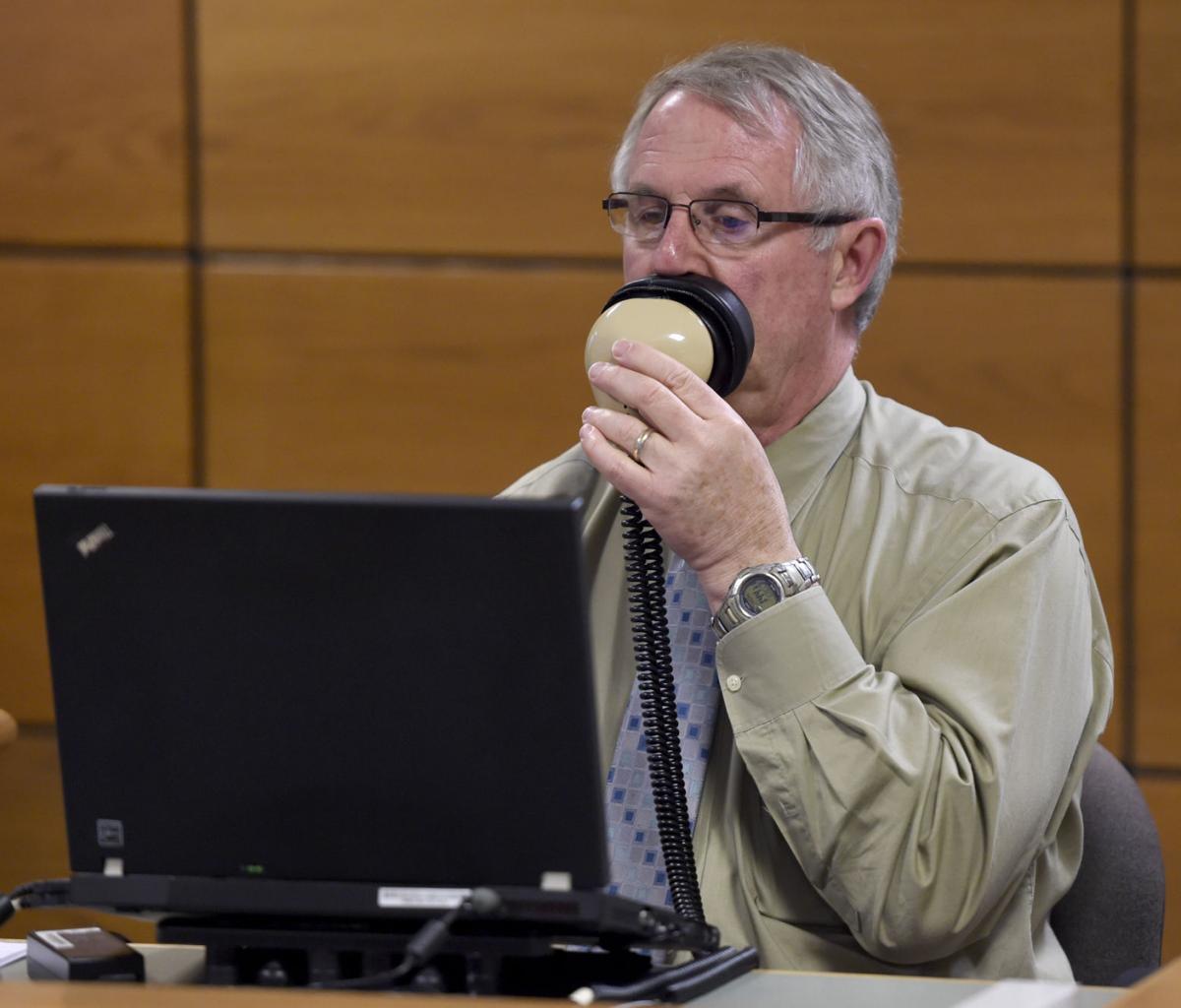
The voice writing method of court reporting (formerly known
as Stenomask reporting) has been around for almost 80 years and is used in the
US military, federal courts, Congress, and in most states, but until now voice writers
have been completely shut out of one state – California. California statute
defines “shorthand” as “the making, by means of written symbols
or abbreviations in shorthand or machine shorthand writing,” and only
court reporters that have passed the state-administered Certified Shorthand
Reporter examination are permitted to practice in the state.
Facing a critical court reporter shortage, the Court
Reporters Board of California (CRB) decided to investigate the possibility of
allowing voice writers to take the licensing exam, utilizing voice writing
equipment. North Carolina-based court reporter Tori Pittman, who trained as a
stenotype reporter and then trained as a voice writer after developing
repetitive stress injuries, demonstrated the method for the Board and answered
questions.
After the meeting, the CRB surveyed licensees. Though just
1/3 of licensed court reporters either had no opinion or were in favor of
allowing voice writers to test, the CRB determined that was a sufficiently
positive reception, and announced they will allow voice writers to sit for the
licensing examination in the near future, possibly as early as March, 2019.
Voice writers will be held to the same standards as stenotype reporters during
the test and in practice; the only difference will be the equipment used to
capture the record.
For most professionals, change is scary, and technology has
rapidly impacted the court reporting field. As the California Deposition
Reporters Association wrote in an email to members, “Working together with
open minds to keep our profession strong…is more important than ever.”
At Greater Raleigh Court Reporting, we’ve proudly embraced new
technologies and maintain that the quality of the transcript isn’t dependent
upon the reporter’s method, but the reporter’s skill. We are pleased to see
that the CRB has officially recognized this as well.
Book your next deposition now with Greater Raleigh Court Reporting: http://raleighcourtreporting.com/schedule-service
The Olympics of Court Reporting

At one point or another, every court reporter wants to shout
at attorneys, “I am a human being, not a machine!”
Depositions can be grueling for all involved, especially
day-long depositions with binders of exhibits and legions of attorneys
attending. Sometimes there are hard time limits dictating when the deposition
has to conclude due to either flight schedules or witness availability, and
attorneys are tempted to have a “working lunch” or forego taking
breaks.
That’s a bad idea and, more than that, impossible for the
court reporter, who can’t both eat lunch and capture the record at the same
time.
Regardless of the method the court reporter uses to capture
the record, taking a deposition is physically taxing. Sure, all of the
participants in the deposition are sitting in a conference room, but court
reporters sit in the same position for hours at a time. A number of court
reporters develop repetitive stress injuries requiring surgery over the course
of their career. And, the amount of concentration involved in making sure every
objection is properly attributed, every word is taken down accurately, every
exhibit is noted, and spellings for proper nouns are gathered, is immense. By
the end of an all-day deposition, most court reporters are totally exhausted,
mind and body.
It is important that regular breaks are taken, approximately
every 90 minutes, to give the reporter the opportunity to stretch, to have a
mental reprieve, and to, well, use the facilities.
In most depositions, counsel will ask the witness every hour
or hour and a half if they would like to take a break or if they would like to
keep on going. Rest assured, almost every time they ask the witness that, that
the court reporter is crossing their fingers that the witness will say yes.
Next time you’re in a deposition, remember that if you think the witness might
need a break, the court reporter might need one too. Your court reporter will
love you for it.
For your next deposition in the Raleigh/Durham area, please call Greater Raleigh Court Reporting at 919-586-8011 or book online: http://raleighcourtreporting.com/schedule-service
The Olympics of Court Reporting

For attorneys and witnesses, when the deposition ends, the
hard work is done. For a court reporter, the end of the deposition signals the
beginning of a team process to produce an accurate and complete transcript to
be delivered to the attorneys.
Here’s what happens behind the scenes at Greater Raleigh
Court Reporting after the deposition ends.
1. The court reporter runs their stenographic notes through CAT
(computer-aided transcription) software, which translates the notes into
English.
2. The translated note file is sent to a scopist,
who edits the reporter’s notes into full transcript format.
3. After the scopist
has completed their work, the court reporter listens to the audio while reading
through the deposition transcript. Their job is to catch any missing or
incorrect words, to check the spelling of proper names or technical
terminology, and to ensure that proper punctuation is used.
4. Now it’s time to add on the title pages and
certificate pages. The reporter ensures
that the case caption is entered correctly, that appearances of counsel are
correct, that on and off record times are correct, that the court reporter’s
certificate is correct, and that examinations and exhibits are listed correctly
in the table of contents.
5. The reporter then
uploads their transcript, signed certificate, audio files, order forms, and
production worksheets to Greater Raleigh Court Reporting.
Office staff:
Now the final transcript goes to the office staff for
delivery to the attorneys, but there’s a little more work to be done first. The
office staff will:
- ·
Scan deposition exhibits to be attached to the
transcript file
- ·
Save the transcript in various file formats,
depending on what the attorneys ordered - ·
If a hard copy was ordered, print and bind the
transcript and exhibits - ·
Create billing statements for each attorney - ·
Deliver the transcript via email (and by mail if
a hard copy was ordered)
As you can see, transcript production really is a team
effort. At Greater Raleigh Court Reporting, where our team
produces dozens of transcripts each week, we’ve got it down to a science.
The Olympics of Court Reporting

Capturing the Record
“On Location”
Court reporting is a demanding profession even under ideal
circumstances. Some people don’t realize that in addition to “normal”
court reporting work, from time to time we’re called on to leave the courtroom,
deposition suite, or hearing room and capture an accurate record from a remote
location.
For example, in a murder trial one of our reporters was
working on, the defense wanted the jurors to view the Sallyport area of the
jail and for one of the jailers to testify about procedures from that location.
In numerous civil or criminal trials, jurors have visited the scene of an
accident or crime and heard testimony from an expert while on location. Occasionally
portions of a video deposition will be taken at the scene of an accident so the
video can be played for the jury, and the parties don’t incur the expense of
transporting jurors and court officials to a scene.
No matter the location, all of that testimony must be taken
down. The same level of accuracy is expected from the reporter on location and
in the conference room.
In a long-running federal court case regarding desegregation
of schools in Arkansas, U.S. District Court Judge D. Price Marshall, Jr. recently
toured three schools at the invitation of one of the attorneys. The judge
is being asked to determine “whether any construction differences at the
[Pulaski County Special School District] schools violate
the district’s desegregation plan, Plan 2000, and related court orders.”
His court reporter, Christi Jacimore, accompanied him, along
with “an entourage of courtroom staffers, school district officials,
architects and attorneys for the different parties in the 35-year-old lawsuit.”Jacimore
was tasked with creating the official record of any testimony from school
district officials and architects given throughout the three school tours.
Fortunately, staff wasn’t expected to dress in courtroom attire that day, but
it had to have been quite a grueling day for a reporter attempting to maintain
order and remind attorneys and witnesses to speak loudly, clearly, and one at a
time while touring school campuses. Hats off to you, Christi Jacimore!
Greater Raleigh Court
Reporting’s staff of experienced court reporters can capture the record
wherever and whenever they’re needed – even on a school campus. Use our easy
online scheduling tool or call 919-586-8011
The Olympics of Court Reporting

Not All
Videoconference Depositions Are Created Equal
So you’re sold on the convenience of taking depositions
remotely so you can avoid the hassles of travel and save your client money. You
use Skype or FaceTime to keep in touch with your family when you do have to go
out of town on business, so you know how good videoconferencing technology has
become. But did you know that the service you use for a videoconference
deposition can have a huge effect on the quality of your deposition experience
and the final transcript?
At Greater Raleigh Court Reporting, we’ve made staying at
the forefront of new legal and court reporting technologies a top priority.
When videoconferenced depositions first went into use, Skype was the most
widely-used technology and essentially the only system we used. Over the years,
technology has evolved, and so have videoconferencing options. Unfortunately,
some court reporting firms still rely on Skype for videoconferenced depositions
when there are much better alternatives available.
Skype has the advantage of being the first widely-used
videoconferencing app, and it doesn’t require users to invest in specialized
equipment. It allows multiple attendees in multiple locations to attend a
meeting simultaneously. There are a number of reasons though that Skype
shouldn’t be used for a deposition.
First, the connection is not very reliable. Ideally all
attendees would be on a computer that’s hardwired to a modem or access point.
If multiple attendees are using Wi-Fi connections, the video or audio will lag
or cut out completely. With spotty
audio, getting a verbatim transcript is nearly impossible. If the connection is
lost completely, it takes time to get everyone reconnected, and is very
frustrating.
In addition, attendees will all need a Skype account to take
part in the deposition, and Skype connections can be easily hacked.
Although Skype doesn’t require users to invest in external
equipment, if it’s used for a deposition, an external USB microphone and webcam
is necessary. If you’re relying on the laptop’s camera, the only person who
will be visible is the deponent. A laptop’s built-in microphone is directional,
meaning it only records sounds coming from directly in front of it. An external
omnidirectional microphone with noise reduction is required so all participants
can be heard.
Although there is an option to record Skype meetings in its
business edition, it’s not a standard feature, making recorded videoconference
depositions more of a hassle to obtain.
For the best videoconference deposition experience, you
should utilize a court reporting firm that uses a paid service. You will receive a calendar request and meeting
invitation with instructions and a secure link to join the deposition at the
appropriate time. Attendees can join using the secure app on a mobile phone,
tablet, laptop, or desktop – and they don’t have to have an account.
Once the deposition starts, you’ll notice that it is much
easier to see and hear all of the participants. The system uses its own
integrated audio hardware and camera, providing HD sound and video. Mobile
videoconferencing doesn’t require large amounts of bandwidth, so attendees can
join the deposition using Wi-Fi or a mobile device without a reduction in
quality. The screen view can be split when a witness is testifying about an
exhibit, with part of the screen showing the exhibit so there is no question
about which document is being referenced.
In addition, we are able to record separate audio and video
files of the entire deposition so it can be preserved for utilization in the
courtroom or for any other purpose.
We’ve used this technology to conduct thousands of
videoconferenced depositions attended by attorneys around the country. In this
area, our expertise is unrivaled. To schedule a mobile videoconferencing deposition,
contact us at:
919-586-8011, or you can book online at:
http://raleighcourtreporting.com/schedule-service
The Olympics of Court Reporting

Back in the beginning of my career, I had the opportunity to
work with a locally famous plaintiff’s attorney who would later become a US
Senator and nominee for Vice-President of the United States. But during a long
week of depositions in a case involving a Grammy-award winning entertainer I
decided I wanted to work with this attorney any time for an entirely different
reason:
He actually wanted me to have a lunch break.
There were four law firms involved in the depositions and
binders of exhibits. We weren’t sure we could finish all of the depositions
scheduled during that week. Naturally, one of the attorneys proposed just
working through lunch. The attorney said, “Well, that’s great for us, but she
can’t really eat and dictate what we’re saying at the same time. And it’s not
fair for us to expect her to only have 15 minutes to scarf down a sandwich
before starting back again.”
Amen, brother!
Court reporters are not machines. And while attorneys may
think, “Well, I can push really hard for a few days to get these depositions
done and then I can go back to my regular hours,” court reporters don’t have
that luxury. Can you imagine if every attorney thought that way?
Here are few characteristics that our favorite attorneys have
in common:
1. They give
mostly accurate time frames.
If a deposition
will take 6 hours, they don’t say it will take 3 hours. When they say “One more
question,” it doesn’t turn into another hour of cross-examination.
2. They take
regular breaks.
Since, again,
court reporters are not machines, they do need to use the restroom at times.
Reporters don’t want to interrupt you to ask for a “bio break,” and greatly
appreciate attorneys who take a short break every 60 to 90 minutes.
3. They make an
effort to speak slowly and not mumble.
Attorneys
can’t control opposing counsel interrupting and speaking over them, but our
favorite attorneys control their own speech habits.
4. They give the
court reporter an appropriate place to set up their equipment.
There have
been times where reporters have been given a backless stool to sit in and the
corner of a desk to set up their equipment. If the deposition is being taken at
a doctor’s office, the attorney doesn’t always have control over the setup.
Even if they don’t have control over it, our favorite attorneys will speak up
for the court reporter and find the most comfortable location for their
equipment.
While every court reporter has horror stories about staying in
a deposition until 2 a.m., having multiple attorneys screaming at each other on
the record simultaneously, or being forced to report for three hours straight
without a bio break, they also have stories about the wonderful attorneys who
made their job easier.
The Olympics of Court Reporting

We love checklists! Whether it’s for honey-do chores or
making sure our production staff gets your transcript out without a hitch,
detailed checklists keep things on track and minimize stress.
Scheduling a deposition is easy – simply pick up the phone
or send an email, right? But if your paralegal doesn’t have all of the
pertinent information, or if that information is not communicated to the court
reporting firm, you run the risk of getting into some sticky, time-consuming,
or expensive situations.
To help avoid those situations, we’ve created this
downloadable deposition scheduling checklist. (Click to download printable PDF version.)
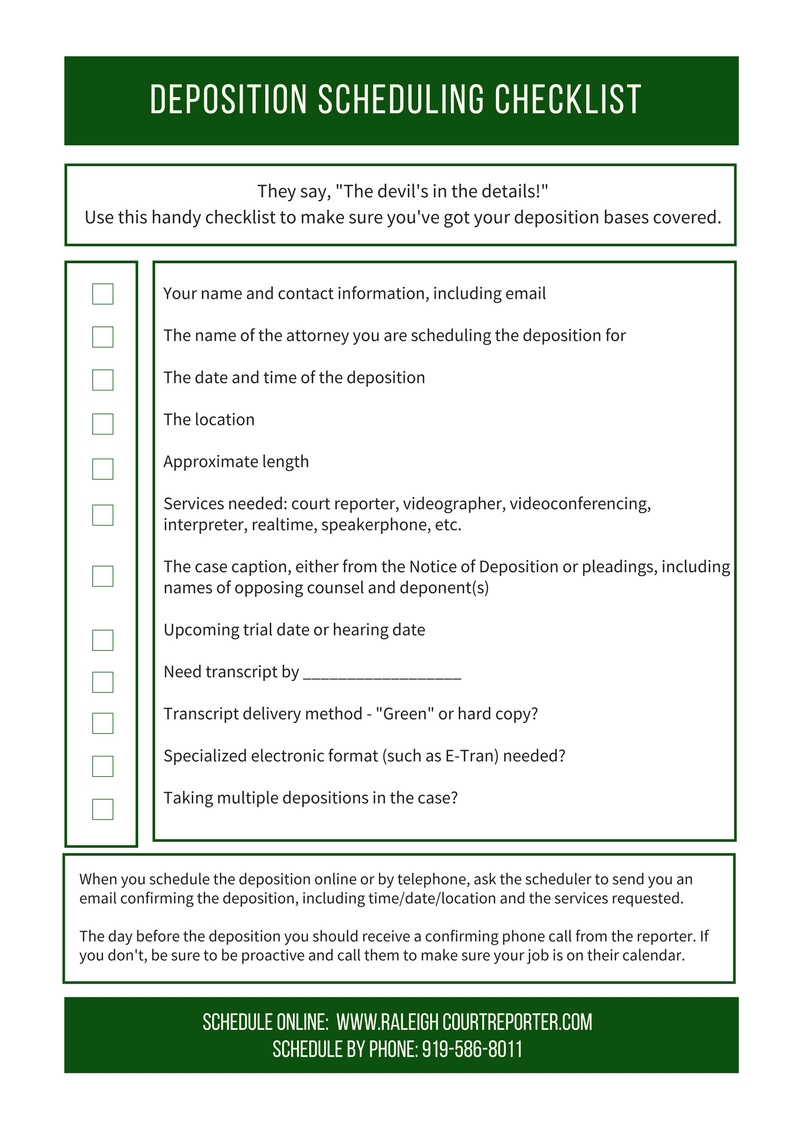
The Olympics of Court Reporting
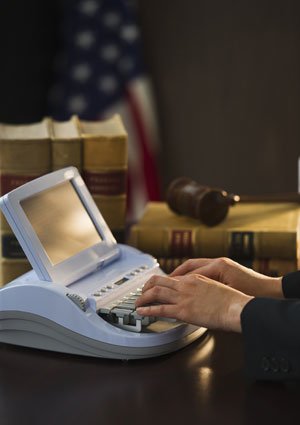
Depending on which area of the country you’re in, you’re likely used to a certain method of court reporting and may not be aware that there are multiple methods by which court reporters capture the record.
The method with which most people are familiar is stenotype, in which the reporter uses a special typewriter to capture the proceedings in phonetic shorthand. Stenomask reporters, or voice writers, are most familiar to people who have served in the military. The newest type of reporter is an electronic reporter.
Some court reporters have very strong opinions about each method and which one is “the best.” At Greater Raleigh Court Reporting, we’ve always maintained that it’s not the method that makes a good record, it’s the reporter. We back up that philosophy with our actions – we have reporters who use each method.
With that said, let’s review the various types of court reporters you might meet in your depositions.
1. Stenotype reporters use phonetic shorthand and a specialized keyboard to capture the proceedings. A computer-aided transcription program then translates the shorthand into English, which the reporter edits and proofreads to create the verbatim record.

2. Stenomask/voice writers dictate the proceedings verbatim into a mask, which is connected to a digital recording device. There are large masks, which cover the reporter’s nose, and mini masks, which only cover their mouth. They are trained to speak in a low voice – not a whisper – at such a level that the recording equipment picks it up but others in the room cannot hear them. The digital file is either translated using voice recognition technology or transcribed to create the final transcript.
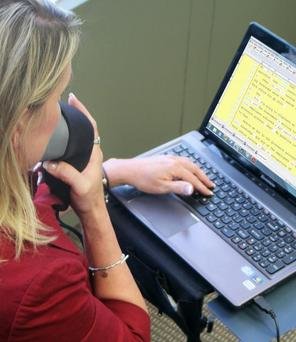
3. Electronic court reporters use specialized software and high-quality audio-visual equipment to record testimony. The software allows them to record each speaker’s audio feed on a separate track to ensure complete accuracy of the transcript. Electronic reporters also take contemporaneous notes of the proceedings within the software, which are then linked to that spot in the audio record.
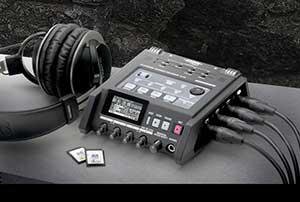
Regardless of which method your court reporter uses, they will all be able to read back a question and answer, mark exhibits, warn you not to speak over each other, provide you with an accurate verbatim transcript, and serve as an impartial guardian of the record.
Schedule your next deposition now with Greater Raleigh Court Reporting: 919-586-8011.